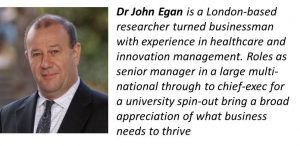In a week of political brinkmanship regulations have become a thorny subject, but aligning regulations is a practical way to make relationships work, as is eminently demonstrated in healthcare, John Egan writes.
It has been a week in which “regulatory alignment” has hit the headlines.
Today, a form of words has been agreed by the European Union and UK administrations that have allowed the Brexit separation talks to move onto the Phase 2 subject of trade.
The Irish border with Northern Ireland exposed a fault line in the UK approach to Brexit. The seismic events that followed severely rattled the British government. Despite crucial deadlines set in hours rather than days, the problem of avoiding a hard border after Brexit seemed intractable.
Regulatory alignment across both the Northern Ireland border and the Irish sea inevitably means alignment between the whole of the UK and Europe. This conundrum has today been kicked down the road, yet its resolution is a matter of pragmatism rather than principle.
Earlier this week, in a small committee room at the Palace of Westminster, a discussion on the implications for the multi-billion pound pharmaceuticals industry of the UK leaving the EU was able to imagine a scenario in which the notorious regulatory alignment appeared much more convivial and positive.
It was a largely foreseeable dialogue, based on an awareness that some regulations – independent of their geographical origin – are good regulations.
Rachel Reeves, Chair of the Business, Energy and Industrial Strategy Committee summarised “the most worrying” evidence the committee had received.
“Astra Zeneca have said although the costs of duties are not attractive, more important is the extra administration and delays that could undermine our ability to conduct and run clinical trial programmes in and from the UK.
“The BMA (British Medical Association) has said it could take two more years to get new drugs if our regulatory system diverges.
“The American Pharmaceutical Group says that a no-deal scenario would have a detrimental impact on the UK economy and threaten access to medicines.
“Do you think any of that is overdone … or could [regulatory] divergence delay access to drugs in this country for British patients?”, Ms Reeves asked Mike Thompson, Chief Executive of the Association of the British Pharmaceutical Industries.
Mr Thompson thought not and used an example of clinical trials to explain why.
As a result, British patients would not receive the latest medicines, NHS hospitals would miss the income from their involvement, doctors would miss out on the benefits of using the latest medicines and the virtuous circle that improves healthcare in the UK will be broken.
Imagine a new blockbuster drug in its final (Phase 3) clinical trial, which could involve 8,000 patients and may need 40 clinical centres. It would be impractical to try to recruit all these patients in the UK – a Europe-wide trial would be essential. The UK could be involved but only with regulatory alignment. No pharmaceutical company would involve the UK if there was a risk that Europe would reject its results due to regulatory divergence. And at merely 2.3 per cent of the global pharma market, no company would undertake the huge expense of a separate UK clinical trial.
As a result, British patients would not receive the latest medicines, NHS hospitals would miss the income from their involvement, doctors would miss out on the benefits of using the latest medicines and the virtuous circle that improves healthcare in the UK will be broken.
All that is needed is regulatory alignment. That is, for the UK to adopt a new EU clinical trials directive that the very well-regarded UK Medicines and Healthcare products Regulatory Agency (MHRA) played a large part in developing.
The MHRA could then possibly take an observer’s seat on the European Medicines Agency (EMA) scientific panel which assesses the evidence for market approval, and continue to provide Europe with their recognised expertise. The EMA – which will move as a consequence of Brexit from London to Amsterdam – might even consider a satellite office in Canary Wharf, suggested Mr Thompson.
Other barriers to cross to assure life-saving drugs are available across Europe, including the UK, could be treated in the same way.
The need for each batch of pharma products to be separately tested in the UK and Europe, prior to release to hospitals and patients, could be avoided.
European manufacturing plants link their production lines to make pharmaceutical products. The UK has neither the capacity nor the competences to go it alone, those giving evidence told the committee. Its excellence lies in the essential research and early-stage innovations from which new therapies emerge – as evidenced by recent investments made by global pharma companies such as German-based Qiagen and MSD. Frictionless trade is important to enable this finely tuned machine to operate efficiently. Delays for fragile products due to customs clearance could be extremely costly.
It routinely takes 15 months for a generic drug to gain regulatory clearance for sale in Europe. It is now 15 months to March 2019 and Brexit – assuming agreement on a transition period cannot be reached. Pharma companies cannot afford the risk of not acquiring new European testing sites and must now bypass the MHRA for alternative EU-based regulatory organisations to seek approval to market their products. The UK will then be well down their priority list, below the strategic markets of the USA and Europe.
The drug shortages which have been recently reported in the UK are likely to worsen.
The industry witnesses at the Select Committee meeting were unanimous in noting that, while the UK leaving the EU might bring with it some minor benefits at the margins, such as faster early stage (Phase 1) testing, the costs incurred by doing so would be far greater.
To avoid this, all that is needed is regulatory alignment – and with strong science, goodwill and a fair wind it could be possible.
These regulations would then serve to organise expert opinion and company activity to make available healthcare products that are safe and effective for patients.
And the NHS does not have to buy the products if it chooses not to.
It is a win-win that one might also choose to seek for Ireland.

Headline Photo Credit: pogonici/Shutterstock.com




